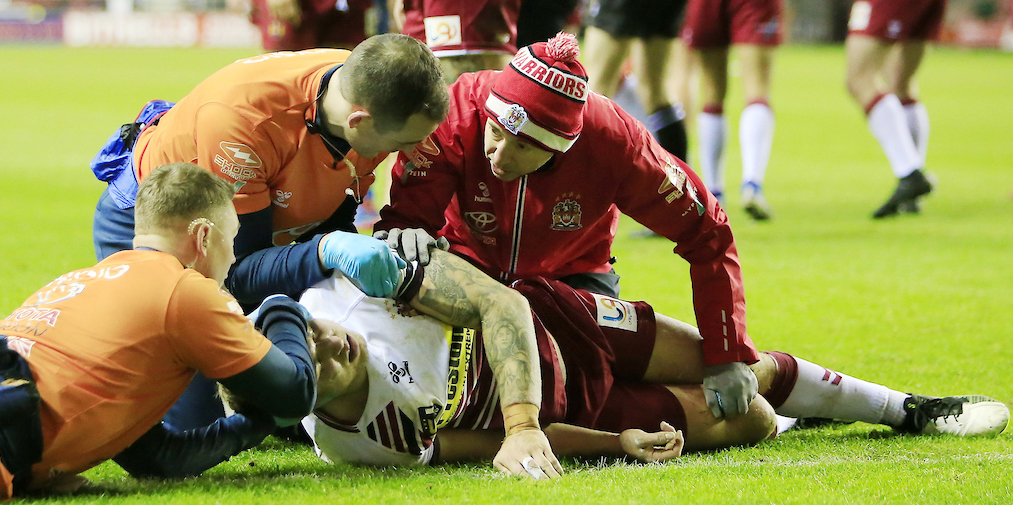Make a Donation
And help us make a difference.
We need your support to be able to continue enhancing the lives of people in communities wherever Rugby League is played.

The joint venture between Rugby League Cares and the Rugby Football League involved presentations from two of the country’s foremost experts in brain health and how it affects athletes, Professor Craig Ritchie and Professor Willie Stewart.
The online webinar was chaired by Kevin Sinfield MBE and attended by current and former players, club and governing body administrators and player welfare representatives from RL Cares and the clubs.
The event looked at the impact of concussion, head trauma and a wide range of other topics, as well as updates on the research into this important subject that is taking place both in the UK and across the world.
Prof Stewart leads the Glasgow Brain Injury Research Group, based at the Queen Elizabeth University Hospital, Glasgow, and specialises in traumatic brain injury, with a focus on links to contact sport.
Recent research in Scotland, prompted by concerns of the health risks from footballers heading a ball, suggests that footballers are 3.5 times more at risk of suffering degenerative brain conditions in later life than the general population. Around three per cent of people will be diagnosed with neuro-degenerative conditions in their lifetime.
Statistics also show that ex-professional sportsmen and women are 50 per cent less likely to die from cardio-vascular disease, 80 per cent less likely to have lung cancer and 50 per cent less likely to experience mental health issues such as depression, anxiety and addiction.
“It is clear that participation in high level elite sports is great for long term health because it reduces mortality and we need to work out what is going on in the minds and bodies of athletes,” said Prof Stewart.
“Unfortunately, once people have dementia we can’t change the course of the disease. However, there are things we can do to improve our brain health in mid-life. People shouldn’t assume that because head injuries happen, they only have to wait for inevitable outcomes.”
Prof Ritchie is Professor of the Psychiatry of Ageing at the University of Edinburgh, and Director of the Centre for Dementia Prevention. He outlined some of the challenges facing medical science when it comes to diagnosing and treating neuro-degenerative diseases.
“Despite a lot of hard effort, we don’t yet have a single test or group of tests that confirm a diagnosis,” he explained. “We can’t do a biopsy of the brain, for example, so we have to look at the symptoms and the risk factors, and rely on brain scans and blood tests.
“The problem is that some of the symptoms are normal things that can happen to any of us, such as forgetting people’s names. There are also other reasons people may be forgetful, like anxiety, depression and stress. The Number 1 risk factor is age.”
The webinar concluded with a Question and Answer session.
Steve McCormack, the Head of Welfare at Rugby League Cares, said: “On behalf of the wider game I would like to thank Professor Ritchie and Professor Stewart for giving us such a valuable insight into the work that is going on around brain health.
“Rugby League takes the issue of brain health in players very seriously, which was reflected by the wide range of attendees we had at the seminar.
“It was particularly reassuring to hear a balanced view because we should never lose sight of the considerable health benefits of playing sport.
“Our commitment to safeguarding the welfare of players is unswerving and we will continue to work with medical experts and scientists to assist their research wherever we can.”
Laura Fairbank, the RFL’s Head of Medical and Integrity, said: “It was an informative and thought-provoking conversation with an emphasis on positive approaches to a serious issue for all contact sports.
“We’re really grateful to Kevin Sinfield for chairing the discussion, and to Professors Willie Stewart and Craig Ritchie for sharing their expertise. Their priority was to offer reassurance, insight and information about brain health to the distinguished group of former Rugby League players who joined the call.”
The webinar will be available to watch again on the Rugby League Cares website next week.
And help us make a difference.
We need your support to be able to continue enhancing the lives of people in communities wherever Rugby League is played.